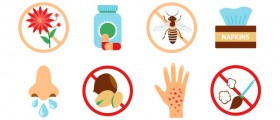Overview and indication
Neosporin is an antimicrobial ointment that is indicated to be used as an eye ointment for bacterial infections of the conjunctiva.
The product contains the agents neomycin, Bacitracin, and polymyxin B and they all have bactericidal (killing bacteria) actions. These antibiotics all provide a wide range of antibacterial action including covering for gram-positive and gram-negative bacteria.

Precautions
The reaction caused by Neosporin would result in symptoms and signs such as redness, itching, and edema. Regarding other issues that Neosporin could cause include:
- Overgrowth of non-susceptible bacterial organisms as well as fungi if the product is used over the long term.
- Bacterial resistance to the product which may lead to an infection with a drug-resistant organism that causes bigger problems for the patient.
- Patients may complain that their eye infection is getting worse with continued swelling of the eye and a purulent discharge draining from the affected area.
If the patient's infection worsens or a rash or allergic reaction develops with the use of the medication, then the user is advised to immediately discontinue the medication and consult with their doctor for further management.
Anaphylaxis
Anaphylaxis due to the use of Neosporin has been reported although this is an extremely rare occurrence.
Anaphylaxis occurs when the body's immune system reacts to an allergen by releasing chemicals such as histamines and these compounds cause the body to go into shock. The signs and symptoms of anaphylaxis may include:
- A difficulty with breathing and wheezing occurs due to constriction of the airways, or swelling of the tongue or throat.
- Skin reactions such as itching and hives or having a flushed or pale appearance of the skin.
- Low blood pressure which can cause complaints such as dizziness or may cause the patient to faint.
- A weak and rapid pulse as the body tries to compensate.
- Nausea, vomiting, or diarrhea.
The management of anaphylactic reactions include:
- Supplying oxygen to the affected patient together with medication such as Albuterol to help relieve the constricted airways.
- Intravenously administering antihistamines and steroids to reduce the inflammatory response of the body and the histamines produced by the immune system
- Immediate intramuscular administration of adrenaline if an intravenous line is not up yet to help constrict the blood vessels so that the blood pressure can increase and to divert blood to the essential organs of the body.
- www.ncbi.nlm.nih.gov/pmc/articles/PMC2267473/
- Photo courtesy of SteadyHealth
















